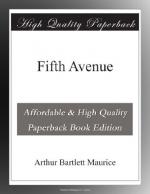Perhaps. These may be the doubts of the grown-ups and the sophisticated. Meditate thus cantering along the bridle-path or lolling back in the tonneau of the motor-car that has come to replace the stately, absurd horse-drawn equipage of yesterday. Survey with ennui. Brood over unpatriotic comparisons. Paraphrase Laurence Sterne to the extent of mumbling how “they order this matter much better in Hyde Park or in the Bois de Boulogne.” Quote Mr. Henry James about “the blistered sentiers of asphalt, the rock-bound caverns, the huge iron bridges spanning little muddy lakes, the whole, crowded, cockneyfied place.” In that way jaundiced happiness lies. But the soul of Central Park is not for you. Once upon a time there was a Central Park. The approaches to it were along sedate avenues or by restful side streets. When the Park was reached there were donkeys to ride, and donkey-boys, highly amusing in their cynicism and worldly knowledge, in attendance. The “rock-work” caverns were in fancy of an amazing vastness, and the abode of goblins, elves, gnomes, enchanted knights, persecuted princesses—all the creatures of delightful Fairyland. A certain dark, winding, apparently endless tunnel was the Valley of the Shadow of Death of John Bunyan’s allegory. On the sward before the entrance Christian grappled with Apollyon: “And Apollyon, espying his opportunity, began to gather up close to Christian, and wrestling with him, gave him a dreadful fall; and with that Christian’s sword flew out of his hand. Then said Apollyon, I am sure of thee now. And with that he had almost pressed him to death; so that Christian began to despair of life. But, as God would have it, while Apollyon was fetching of his last blow, thereby to make an end of this good man, Christian nimbly reached out his hand for his sword, and caught it, saying, Rejoice not against me, O mine enemy; when I fall, I shall arise; and with that gave him a deadly thrust, which made him give back, as one that had received his mortal wound. Christian perceiving that, made at him again, saying, Nay, in all these things we are more than conquerors through Him that loved us. And with that Apollyon spread forth his dragon wings, and sped him away, that Christian saw him no more.”
“And Christian saw him no more!” With the thrill that those words bring the years fall away and again a boy’s eyes are wide in wonder at the mystery of the world. Then the lake. It was not muddy to the gaze of youth. Instead, it was of a crystal clearness that sparkled in the summer sunshine, and the ride in the swan-boats was a joyous adventure, just as it was a little later to the little girls who owed it to the knightly bounty of Mr. Cortlandt Van Bibber. And what was better than the hours in the Menagerie, when the antics of the monkeys provoked side-splitting laughter, and to stand steady close before the cage when the lions stretched and roared was to feel the thrill of a young Tartarin? “Now, this is something like a hunt!” Times change, and conditions change, and aspects change, but it is we who change most of all, and Romance is still there, given the eyes of youth with which to see it.




